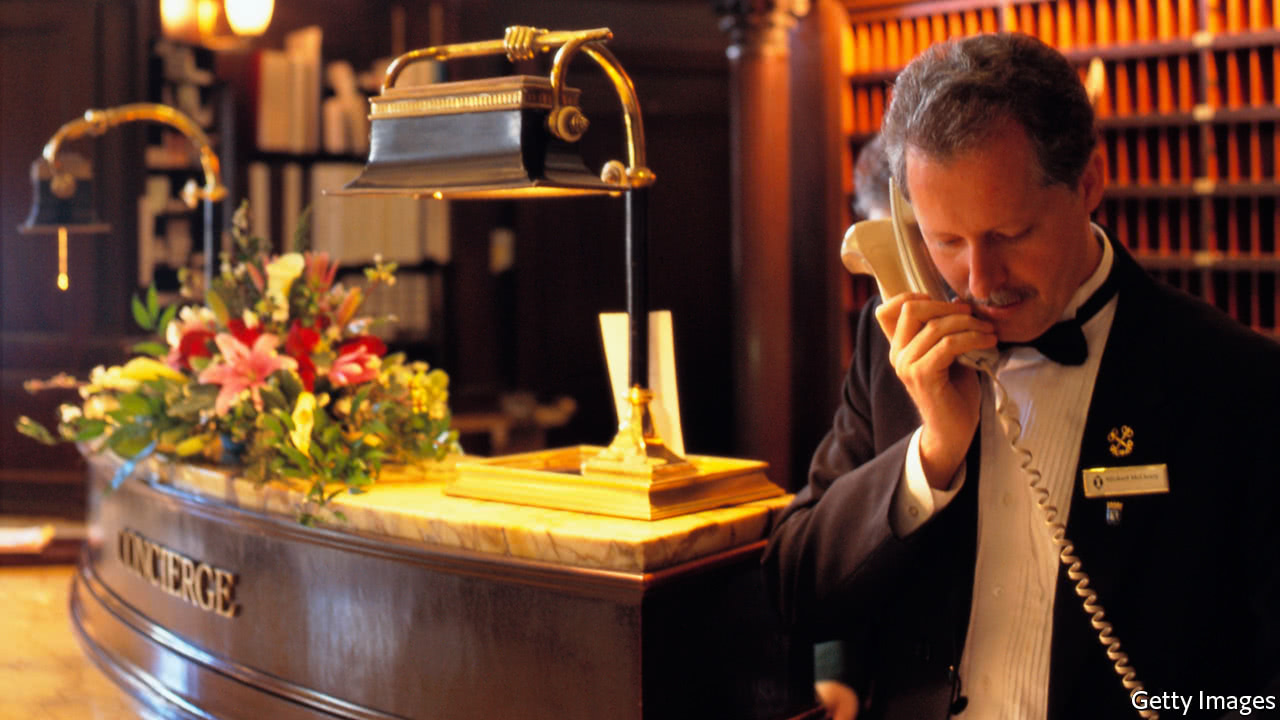
IF BUSINESS travellers need to reserve a table at a restaurant, they may use OpenTable, a website. If they wish to find a nearby museum, a Google search will probably be their first port of call. And if they want transport into town, they can easily hail an Uber. Given that so many services are just one swipe away, is there a need for a hotel concierge anymore?
Increasingly hoteliers think that there is not. The share of American hotels with concierges has fallen from 27% in 2010 to 20% last year, according to a report by the American Hotel and Lodging Association, a trade group. Since 2014 the number of luxury hotels that employ a concierge has declined by 20%.
-
Denmark lowered the age of criminal responsibility to 14, but it did not reduce crime
-
Hotels are employing fewer concierges
-
Are Oxford and Cambridge universities fostering “social apartheid”?
-
Quebec’s ban on face-coverings risks inflaming inter-communal tensions
-
New Zealand’s Labour Party turns defeat into triumph
-
“The Death of Stalin” is a precarious comedic experiment
Though concierges are not extinct quite yet, those that remain tend to work in upmarket establishments. In America 82% of luxury hotels employ concierges, as do 76% of “upper upscale” hotels, the second most glamourous category. After that concierges are a much rarer sight. Just 16% of “upscale” hotels have them. For “midscale” chains, that figure is now only 3%.
One reason that travellers tend to prefer technology is that it can harness the wisdom of crowds. Several hotel-goers told WHYY, a Philadelphia radio station, that it is pointless to rely on a single person’s advice when the recommendations of thousands of people are just a few clicks away.
Another reason is that many people would rather interact with their smartphones than hotel staff. In July a survey found that half of business travellers said they prefer to avoid human contact altogether when on the road.
Unsurprisingly, concierges still think they have an important role to play. They argue that many people still prefer the human touch to a life conducted on screens, as WHYY reported. They tell stories of great feats of valour, using their knowledge and connections to, for example, rescue a bride’s dress from a closed dry cleaner on the day of the wedding. And, increasingly, they are turning to technology themselves. With a tablet in hand, some concierges approach guests, seeking to guide them with their internet research.
Some hotels are turning to more novel approaches to try to keep concierges relevant. In July the Park Hyatt hotel in Melbourne hired a blonde labrador called Mr Walker as a canine concierge. His duties include greeting guests in the lobby and attending client meetings. Cuteness is one characteristic that smartphone apps cannot compete with.
Source: economist
Hotels are employing fewer concierges